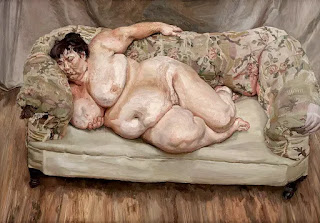Lucien Freud: Benefits Supervisor Sleeping (1995) [1]
I.
According to the 15th-century English monk and poet John Lydgate: 'You can please some of the people all of the time; you can please all of
the people some of the time; but you can’t please all of the people all
of the time.'
And so it is that emails from disgruntled readers are sometimes sent my way, such as the following:
Dear Stephen Alexander,
Whilst pleased to see in your latest post - Reflections on Venus Emerging Slowly from an Old Bathtub - that you at least considered the possibility of extending the notion of what constitutes beauty, as a fat activist I was disappointed to see you include in your list of so-called vile bodies - a truly deplorable phrase, for which you should apologise - all the usual body types, including obese bodies, that have traditionally been discriminated against and classed as ugly.
The fat acceptance movement - also known as fat pride - campaigns to eliminate the social stigma, stereotypes, and prejudice surrounding obesity and empower the big-bodied to feel good about themselves. Being overweight - whatever that means - is not a crime; being fat is not a sin; and obesity is not a disease (anymore than a diet is a cure). Nor do I feel that obese people should be classified as disabled.
Please make an effort to better educate yourself on this issue, so that maybe one day you'll write something positive about Big Beautiful Women such as myself.
II.
In reply, I wrote:
Dear Big Beautiful Woman [2],
You're right, of course, one should always look to increase and deepen one's knowledge of various subjects. But it might interest you to learn that one of the earliest posts published on Torpedo the Ark concerned fat as a transpolitical issue [click here].
Further, as someone who has read quite a lot of radical theory, I'm well aware of how issues concerning not just weight, but race, class, and sexuality, for example, all traverse the (often female) body. And so I have no problem accepting fat activism and, indeed, fat studies as a valid field of interdisciplinary research. I would therefore like to think I'm not particularly sizeist or fat phobic (though accept the possibility of my habouring unconscious bias towards plus-size individuals).
As for the phrase vile bodies, this may be deplorable, as you say, but it is not one I coined and nor, if I'm honest, do I feel inclined to apologise for it [3]. Sometimes we need terms that can make us weep. And arguably, the term that you use to describe yourself - BBW - is just as problematic, as it lends itself to a porno-fetishisation of body size and shape [4].
Having said that, I can see how it might be preferable to be thought sexy - even if in a kinky manner - rather than ugly, unhealthy, or disabled and perhaps an affirmation of one's body type is better than self-loathing (though personally, I'm as wary of taking pride in one's size as I am of taking pride in one's sexuality or race, and certainly don't support the building of an identity politics on the basis of what is often simply shame on the recoil).
Notes
[1] This famous work by Lucien Freud is a portrait of 280lb Sue Tilley, whom Freud painted several times during the period 1994-96, fascinated as he was by the texture of her flesh. It was bought by Roman Abramovich for $33.6 million (£17.2 million), at Christie's New York, in 2008.
[2] I'm using this term - Big Beautiful Woman - to address my correspondent as it was how she referred to herself. Commonly abbreviated to BBW, it was coined by Carole Shaw who, in 1979, launched a fashion and lifestyle magazine for plus-size women. Since then, the term has spread widely and can be found in online dating profiles and on porn sites, for example, replacing other euphemisms for fat, such as full-figured, curvy, or voluptuous.
The male equivalent - Big Handsome Man (BHM) - is often used in the gay community, where those attracted to and seeking out such men are known as chubby chasers.
[3] The term vile bodies is of course associated with Evelyn Waugh and his 1930 novel of that title. Obviously, I was using it in a very different context from the latter, who, if I remember correctly, was referring to the bright young things who shamelessly flaunted their flesh at endless parties.
[4] Fat fetishism - or the sexual desire for the obese other primarily because of their weight and size - often involves feeding so that the beloved object intentionally increases their body fat. Some devotees also enjoy squashing (i.e., the feeling of being crushed beneath mounds of warm flesh). Fat fetishism is usually termed fat appreciation (or fat admiration) - FA - by those in the know.
Whilst I'm happy for those involved in this kinky subculture to find pleasure wherever (and however) they like, it's worth noting that the politics of the relationships often mirror, reinforce, or perversely exaggerate existing dynamics of power. There is nothing inherently radical, therefore, in FA or any other form of paraphilia.
Music bonus: Adam and the Ants, Fat Fun - recorded as an unused b-side at Rockfield Studios in 1980 - click here.
This song, from Adam's early punk days, was originally written in collabration with guitarist Lester Square (later of the Monochrome Set). It has remained one he often performs live with the Ants to this day. The track was included in the Adam and the Ants box set, Antbox (Columbia Records, 2000).

No comments:
Post a Comment